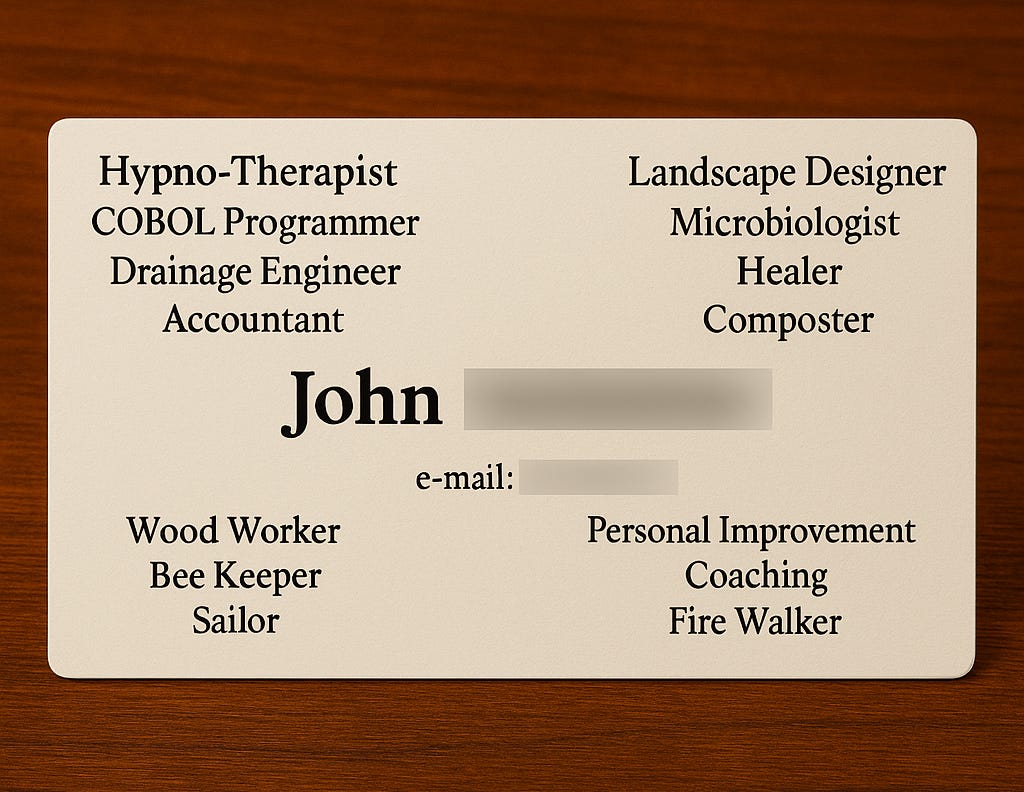Specialization Is for Insects
Titles limit us more than they define us.
Fifteen years ago, I was looking for a contractor to help with some landscaping. A neighbor referred me to somebody named John. He was fascinating and really knew his stuff.
As we wrapped up our meeting, John handed me his business card. A word cloud of careers surrounded his name and contact information. At the top was the profession I was hiring for—landscape designer—but also in that column appeared microbiologist and healer.
I continued to scan the card.
Firewalking accountant? Hypnotherapist software engineer?
I had never seen anything like it. I chuckled to myself and pocketed the card.
Several years and life events later, I came across this Robert A. Heinlein passage in Time Enough for Love, and I thought about John:
A human being should be able to change a diaper, plan an invasion, butcher a hog, conn a ship, design a building, write a sonnet, balance accounts, build a wall, set a bone, comfort the dying, take orders, give orders, cooperate, act alone, solve equations, analyze a new problem, pitch manure, program a computer, cook a tasty meal, fight efficiently, die gallantly. Specialization is for insects.
I scoured my apartment, and I was relieved to find John’s card buried in a junk drawer. This time I saw the card differently; it was a reminder of an important personal realization:
The world is changing so fast that squatting on one expertise isn’t enough to guarantee a livelihood. Rather than cling to a single skill, I need to stay a lifelong learner and trust my curiosity to guide me.
Also, focusing on one expertise sometimes stifles the passion that led me to success in the first place! Letting go of a narrow identity gives me more freedom to be a beginner again and experience the refreshing joy of inspiration.
That’s the real lesson from John’s card: I have permission to be a prism, not just because there is professional upside, but also because it’s fun.
It was good timing for this realization because the more I grow up, the harder it is to encapsulate myself. I used to say Designer. At one point it was Entrepreneur. Then CEO felt attractively accomplished.
Of course, having a clear title helps us present ourselves effectively to the professional world. But the irony is that clinging to a tidy label for security can quietly block us from discovering pursuits that might be even more rewarding, both financially and personally. Embracing our many facets, without waiting for permission, frees us to practice and grow, and be open to opportunities a single title could never contain.
I’ve always loved writing, but I never called myself a writer. I thought I knew what a real writer was and what they had to do to deserve that title. But after encouragement from friends, I started claiming it, not because I’m an expert, but because I enjoy it.
That simple shift changed everything: I stopped worrying about being an amateur and started practicing more seriously. Now I wonder, where else do I gatekeep my growth by comparing myself to imagined standards? Maybe the first step is just to call myself what I want to become.
Titles are neat. People aren’t. I'm going to be more like John.



AI will never take this guys job.
I think that you would like human ecologists! https://www.coa.edu/academics/human-ecology-degree/human-ecology/ I graduated a few years ago, and my best explanation is that choosing classes was like being at a buffet.